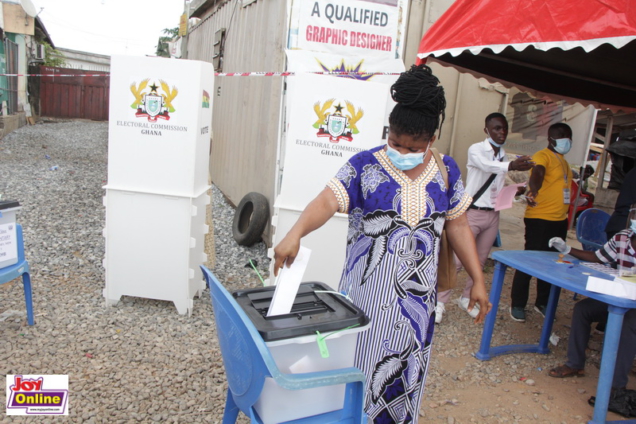As Ghana prepares for upcoming elections, debates about the nation’s electoral processes have intensified. Recently, the Electoral Commission (EC) decided to include Akua Donkor’s photo on the presidential ballot, sparking discussions on transparency, voter clarity, and efficient electoral processes.
This development has led to broader questions about whether Ghana’s current voting systems meet the needs of its growing democratic landscape and if a shift toward electronic voting could be the way forward.
Current Challenges in Ghana’s Voting System
Ghana’s election process is largely manual, with ballots printed, verified, distributed to polling stations, and then counted by hand.
While reliable, this system is not without its limitations. Manual voting can result in logistical delays, security issues, and potential human error. Issues such as long queues, crowded polling stations, and time-consuming vote counting processes are common complaints.
The EC’s recent decision regarding candidate images on ballots also illustrates the difficulties of managing candidate representation and voter information in a manual system.
Despite notable improvements, such as biometric verification, Ghana’s voting process still falls short in efficiency and accessibility, especially as voter expectations rise in line with international standards.
The Benefits of Moving to Electronic Voting
Electronic voting (e-voting) could provide Ghana with a streamlined election process. E-voting allows for faster tallying, reduces human error, and simplifies logistical planning.
This system could also ensure fairer representation by reducing issues such as ballot spoilage, intimidation at polling stations, and proxy voting. With e-voting, inclusivity would improve by enabling remote access for citizens living abroad and in hard-to-reach areas.
Other nations, such as Brazil, India, and Estonia, have successfully adopted e-voting, despite initial challenges with infrastructure and cybersecurity.
For Ghana, transitioning to e-voting could start with a phased rollout, beginning with urban centers and gradually expanding.
Key Challenges in Implementing E-Voting
Despite its potential, implementing e-voting in Ghana would involve significant challenges:
- Infrastructure Needs: Establishing reliable electronic infrastructure, especially in rural regions, would be essential. While phased implementation could help, this step would require significant investment in technology and infrastructure.
- Cybersecurity Concerns: Protecting an electronic voting system from potential cyber threats would be a top priority. The government and EC would need to adopt strong encryption, data protection, and real-time monitoring to prevent fraud. Building public trust in the security of the system would be crucial.
- Public Education and Acceptance: Moving to e-voting would require a mindset shift for voters who are used to paper ballots. Education campaigns would be necessary to help Ghanaians understand and trust the system.
- Legal and Regulatory Framework: Comprehensive legal guidelines would be needed to ensure oversight, transparency, and accountability in an electronic system. Clear protocols for verification and recount procedures would also be critical.
Looking Ahead
E-voting holds promise for Ghana, aligning with its goals of modernizing electoral processes and improving efficiency. Implementing e-voting could streamline the election experience for Ghanaians, potentially reducing political tensions by making the process more transparent and accessible.
However, to make e-voting a reality, the EC and government must engage stakeholders and the public in thorough discussions to ensure an inclusive and well-prepared transition.
As Ghana looks to the future, exploring alternatives to the traditional voting system may be essential.
A well-planned shift to electronic voting could represent a meaningful evolution in Ghana’s democratic journey, but it will require thoughtful planning, rigorous testing, and public education to succeed.
Latest Stories
-
Ghana’s Real Estate: A Booming but fiercely competitive market- Who’s Buying, Who’s Watching, and Where is the Market Headed?
5 minutes -
Armwrestling : Civil Aviation courts Armwrestling for active and healthy lifestyle amongst staff
39 minutes -
Thomas Partey crowned 2025 Ghana Footballer of the Year
1 hour -
IGP orders major raids on illegal mining sites along River Ankobra: 61 arrested
1 hour -
Iran missiles cause multiple casualties in Israel as Israeli strikes hit Tehran oil depot
2 hours -
Parliament lauds nurses and midwives for calling off strike
2 hours -
12 out of 14 districts suffering from illegal mining – Western Regional Minister
2 hours -
Ghana ready for assembling combustion vehicles, production of electric vehicles – Energy Ministry
2 hours -
Don’t buy contaminated food – Environmental director advises
2 hours -
Ghana exposed to global fuel shocks amid empty oil buffers – COPEC
3 hours -
Energy Ministry says suspension of fuel levy due to Iran-Israel tensions, soaring oil prices
3 hours -
Mahama commends Yaa Naa for peace in Dagbon
3 hours -
Father’s Day: Husbands must adapt to changing roles – Ebo Whyte
3 hours -
Ghana validates first National E-Commerce Strategy
3 hours -
Did Israel-Iran tensions prompt Ghana to rethink GH¢1 Fuel Levy implementation?
4 hours

